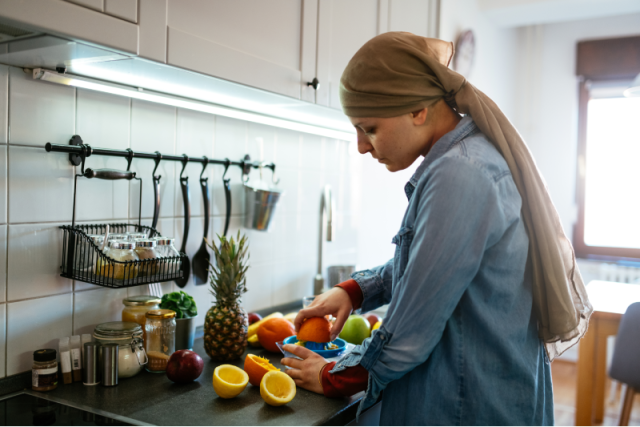The side effects of chemotherapy often pose significant nutritional challenges for patients. While maintaining proper nutrition is crucial to support the body’s ability to tolerate treatment and for recovery, many patients are confused about what they can eat.
“Family members and friends often bombard a patient with information from the internet, and that information is usually not reliable,” said Deborah Hong, MS, RDN, a registered dietitian at the Simms/Mann UCLA Center for Integrative Oncology. “And sometimes the patient reads books, and there’s a lot of ‘do this and don’t do that,’ and they become overwhelmed.”
This can lead to a patient avoiding many foods, resulting in unintentional weight loss, Hong said. Coupled with chemotherapy-induced symptoms like nausea and vomiting, maintaining a healthy weight becomes a struggle.
Nutritional strategies and supplements
Using nutritional supplements is one effective approach to ensuring adequate nutrition.
“Meal replacement drinks such as Ensure, Boost and even some plant-based drinks are readily available in store and online. If patients are too exhausted to eat anything, they can always drink their nutrition,” she said.
Liquid nutrition can be easier to tolerate, especially for patients experiencing mouth sores or difficulty swallowing. Options like liquid yogurt, shakes or soy milk can provide necessary nutrients without the exertion of chewing.
For those who struggle to consume full meals, Hong recommends regular snacks as an alternative.
“Having a snack instead of trying to force down an entire meal can be a better way to maintain your nutritional needs,” she advises.
Food choices and side effect management
The choice of which foods to consume can significantly affect how well a patient tolerates the side effects of chemotherapy. Blander foods, like bananas or toast, tend to be better for patients undergoing treatment.
“If a patient eats something bland, with a lighter taste and smell, then they may not feel as nauseous,” Hong says.
Hydration is also critical during chemotherapy.
“Our bodies are made up of 50% water, so if you're not properly hydrated, you're not able to function as well, either. This can lead to other medical complications,” Hong explains.
She suggests trying drinking water at different temperatures, adding electrolytes or infusing water with fruits to make it more palatable. Alternatives such as frozen fruits, sorbet and sports drinks can also help maintain hydration levels.
The importance of protein
Eating sufficient protein is essential to maintaining muscle mass and other functions of the body, and this is especially true during chemotherapy.
“We try to focus a lot on protein,” Hong said. “We often think about protein in terms of meat, but there are many other foods that are rich in protein.”
Plant-based protein, such as those found in quinoa, whole-wheat pasta, beans, lentils, and tofu, can be easier to digest and better for patients who are averse to or cannot tolerate animal protein sources like meat, fish or eggs.
To alleviate some of the other food-related challenges that confront patients undergoing chemotherapy, Hong suggests practical measures such as using wooden or plastic utensils if you’re experiencing metallic taste, eating food cold to reduce strong odors, and making sure food is prepared in a well-ventilated area if possible. Preparing meals in advance or having family members assist with cooking can also make it easier for patients to meet their nutritional needs.
Food safety considerations
Because chemotherapy can weaken the immune system, making patients more susceptible to foodborne illnesses, Hong advises caution when preparing food. “Don’t eat runny eggs and stay away from raw proteins like sushi and poke during this time. Avoiding raw or undercooked foods can help reduce the risk of food poisoning.”





